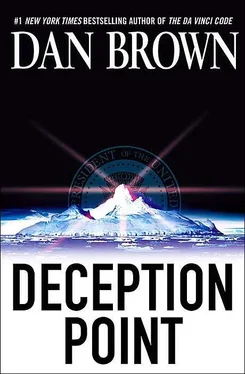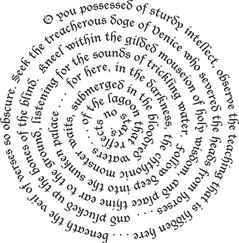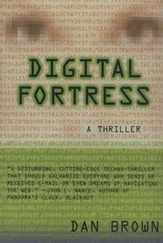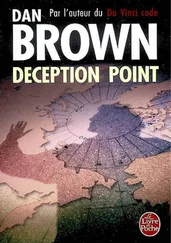“Yes, sir. We’ll be at GAS-AC in an hour.”
“Transport will be arranged. When you reach your ultimate destination, you can call me via more secure channels.” He paused. “I cannot overstate the importance of secrecy to your safety. You have made powerful enemies tonight. Take appropriate caution.” Pickering was gone.
Rachel felt tense as she closed the connection and turned to Tolland and Corky.
“Change of destination?” Tolland said, looking eager for answers.
Rachel nodded, feeling reluctant. “The Goya.”
Corky sighed, glancing down at the meteorite sample in his hand. “I still can’t imagine NASA could possibly have...” He faded off, looking more worried with every passing minute.
We’ll know soon enough, Rachel thought.
She went into the cockpit and returned the radio transceiver. Glancing out the windscreen at the rolling plateau of moonlit clouds racing beneath them, she had the unsettling feeling they were not going to like what they found onboard Tolland’s ship.
William Pickering felt an unusual solitude as he drove his sedan down the Leesburg Highway. It was almost 2:00 a.m., and the road was empty. It had been years since he’d been driving this late.
Marjorie Tench’s raspy voice still grated on his mind. Meet me at the FDR Memorial.
Pickering tried to recall the last time he had seen Marjorie Tench face-to-face—never a pleasant experience. It had been two months ago. At the White House. Tench was seated opposite Pickering at a long oak table surrounded by members of the National Security Council, Joint Chiefs, CIA, President Herney, and the administrator of NASA.
“Gentlemen,” the head of the CIA had said, looking directly at Marjorie Tench. “Yet again, I am before you to urge this administration to confront the ongoing security crisis of NASA.”
The declaration took no one in the room by surprise. NASA’s security woes had become a tired issue in the intelligence community. Two days previously, more than three hundred high-resolution satellite photos from one of NASA’s earth-observing satellites had been stolen by hackers out of a NASA database. The photos—inadvertently revealing a classified U.S. military training facility in North Africa—had turned up on the black market, where they had been purchased by hostile intelligence agencies in the Middle East.
“Despite the best of intentions,” the CIA director said with a weary voice, “NASA continues to be a threat to national security. Simply put, our space agency is not equipped to protect the data and technologies they develop.”
“I realize,” the President replied, “that there have been indiscretions. Damaging leaks. And it troubles me deeply.” He motioned across the table to the stern face of NASA administrator Lawrence Ekstrom. “We are yet again looking into ways to tighten NASA’s security.”
“With due respect,” the CIA director said, “whatever security changes NASA implements will be ineffective as long as NASA operations remain outside the umbrella of the United States intelligence community.”
The statement brought an uneasy rustle from those assembled. Everyone knew where this was headed.
“As you know,” the CIA director went on, his tone sharpening, “all U.S. government entities who deal with sensitive intelligence information are governed by strict rules of secrecy—military, CIA, NSA, NRO—all of them must abide by stringent laws regarding the concealment of the data they glean and the technologies they develop. I ask you all, yet again, why NASA—the agency currently producing the largest portion of cutting-edge aerospace, imaging, flight, software, reconnaissance, and telecom technologies used by the military and intelligence community—exists outside this umbrella of secrecy.”
The President heaved a weighty sigh. The proposal was clear. Restructure NASA to become part of the U.S. military intelligence community. Although similar restructurings had happened with other agencies in the past, Herney refused to entertain the idea of placing NASA under the auspices of the Pentagon, the CIA, the NRO, or any other military directive. The National Security Council was starting to splinter on the issue, many siding with the intelligence community.
Lawrence Ekstrom never looked pleased at these meetings, and this was no exception. He shot an acrimonious glare toward the CIA director. “At the risk of repeating myself, sir, the technologies NASA develops are for nonmilitary, academic applications. If your intelligence community wants to turn one of our space telescopes around and look at China, that’s your choice.”
The CIA director looked like he was about to boil over.
Pickering caught his eye and stepped in. “Larry,” he said, careful to keep an even tone, “every year NASA kneels before Congress and begs for money. You’re running operations with too little funding, and you’re paying the price in failed missions. If we incorporate NASA into the intelligence community, NASA will no longer need to ask Congress for help. You would be funded by the black budget at significantly higher levels. It’s a win-win. NASA will have the money it needs to run itself properly, and the intelligence community will have peace of mind that NASA technologies are protected.”
Ekstrom shook his head. “On principle, I cannot endorse painting NASA with that brush. NASA is about space science; we have nothing to do with national security.”
The CIA director stood up, something never done when the President was seated. Nobody stopped him. He glared down at the administrator of NASA. “Are you telling me you think science has nothing to do with national security? Larry, they are synonymous, for God’s sake! It is only this country’s scientific and technological edge that keeps us secure, and whether we like it or not, NASA is playing a bigger and bigger part in developing those technologies. Unfortunately, your agency leaks like a sieve and has proven time and again that its security is a liability!”
The room fell silent.
Now the administrator of NASA stood up and locked eyes with his attacker. “So you suggest locking twenty thousand NASA scientists in airtight military labs and making them work for you? Do you really think NASA’s newest space telescopes would have been conceived had it not been for our scientists’ personal desire to see deeper into space? NASA makes astonishing breakthroughs for one reason only—our employees want to understand the cosmos more deeply. They are a community of dreamers who grew up staring at starry skies and asking themselves what was up there. Passion and curiosity are what drive NASA’s innovation, not the promise of military superiority.”
Pickering cleared his throat, speaking softly, trying to lower the temperatures around the table. “Larry, I’m certain the director is not talking about recruiting NASA scientists to build military satellites. Your NASA mission statement would not change. NASA would carry on business as usual, except you would have increased funding and increased security.” Pickering turned now to the President. “Security is expensive. Everyone in this room certainly realizes that NASA’s security leaks are a result of underfunding. NASA has to toot its own horn, cut corners on security measures, run joint projects with other countries so they can share the price tag. I am proposing that NASA remain the superb, scientific, nonmilitary entity it currently is, but with a bigger budget, and some discretion.”
Several members of the security council nodded in quiet agreement.
President Herney stood slowly, staring directly at William Pickering, clearly not at all amused with the way Pickering had just taken over. “Bill, let me ask you this: NASA is hoping to go to Mars in the next decade. How will the intelligence community feel about spending a hefty portion of the black budget running a mission to Mars—a mission that has no immediate national security benefits?”
Читать дальше











